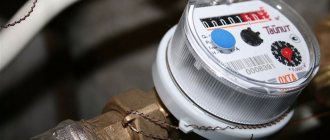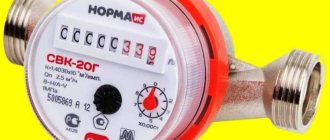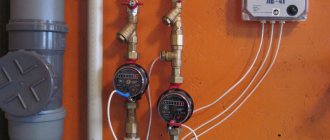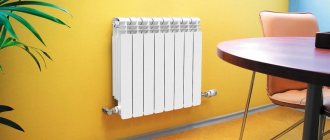What to do if lukewarm water comes out of a hot tap?
Let's figure out how not to overpay for extra cubic meters.
– In our house there are often such cases that a little warm water runs out of the hot water tap. I measured: 30 – 40 degrees. And this happens 2–3 days every month. You have to skip it. Accordingly, we use much more hot water and overpay. I have a small child, and I fill a whole bath every day, so it costs a lot. Where can I go with this question?
The “Hygienic Requirements for Ensuring the Safety of Hot Water Supply Systems” (SanPiN 2.1.4.2496-09) sets clear requirements for the temperature of hot water: it must be no lower than 60 and no higher than 75 degrees Celsius. At the same time, another document - Decree of the Government of the Russian Federation dated May 6, 2011 No. 354 “On the provision of utility services to owners and users of premises in multi-apartment residential buildings and residential buildings” - establishes permissible deviations from these standards. So, at night - from 00:00 to 05:00 - the water temperature should not differ by more than 5 degrees, and in the daytime - from 05:00 to 00:00 - by no more than 3 degrees. It is noted that before determining the temperature, you need to run the water for some time, but no more than three minutes.
Why is hot water lukewarm?
The reasons for insufficient water temperature can be very different.
Firstly, the problem may be in your own faucet: low-quality plumbing sometimes breaks off the partitions, and instead of hot water you get lukewarm water.
Secondly, your neighbors may be to blame. So, an incorrectly installed water heater or heated towel rail can affect the water temperature in your apartment.
Another reason may be improper regulation of the water supply. Simply put, your resource supply company does not sufficiently heat the water that goes to the apartments.
However, there may also be external reasons. For example, your home may be the last one on the hot water line. That is, first several high-rise buildings in front of you take hot water, and only after that the water supply goes to your house. If this line is not looped, then it turns out that in such a dead-end branch the hot water cools down, or even does not warm up to the required temperature at all.
What to do?
First of all, it is worth noting that there is no point in taking measurements of the water temperature in your apartment yourself - they will not be taken into account by specialists anyway. Therefore, Andrey Vorobyov, an expert at the Public Chamber of the Kirov Region, advises immediately contacting your management company:
– We must not forget about the right of every consumer to contact his own management company; no one will do this for you. After applying, you will have to measure the water temperature and draw up a corresponding report. If the temperature is lower than permissible, then by law you will be required to recalculate.
However, the following situation may arise: if your problem with cold “hot” water is not constant, but arises only from time to time, then by the time a specialist from the management company arrives, the temperature in the tap may well be close to the standards. Therefore, Andrey Vorobyov especially notes that in this case, only installing a meter with a temperature sensor can help: such a device considers it as cold when the water temperature is below 40 degrees. Accordingly, you will not be able to overpay for pseudo-hot water.
However, if you make such a decision, you may encounter some resistance from the management company. But the maximum that they can do is express their prohibition verbally, but it will not carry any legal force.
– In 2012, the Criminal Code of the Leninsky District decided to challenge in court the decision of the prosecutor’s office, which canceled the Criminal Code’s ban on installing meters with a temperature sensor. But the court did not take the management company’s side,” says Andrey Vorobyov. “Since then, I don’t know of a single case where a management company would refuse residents to install such devices.
However, keep in mind that if interruptions in water temperature occur 2-3 times a month, then a meter with a temperature sensor will not help you - it simply will not pay for itself. Its installation makes sense if, due to insufficient hot water temperature, you lose at least 3 - 5 cubic meters per month.
And one more important point that also needs to be taken into account. Let's imagine a situation that all your neighbors, who are experiencing similar problems with hot water, decide to install such meters. In this case, less hot water will flow through individual hot water meters, but the indicators of the common house meter will not change. That is, all this “underheating” will go into the “heating” line and will be distributed as general house needs across all apartments. It turns out that residents will pay less for hot water and more for heating. And here the one who consumes the most hot water will save the most. And some may not save anything at all.
However, Andrey Vorobyov notes that if such a situation arises, it will be regulated at the legislative level. This was the case with general house needs for electricity, cold and hot water, when costs were transferred to the management company.
– For example, the current standard for common house needs for cold and hot water supply is 0.04 cubic meters per square meter of common property area. If you spend more, then the management company must pay the difference between the standard and actual consumption. The same scheme could be introduced for heating, says the expert.
Another solution to the problem of insufficient hot water can be a water heater. Modern equipment allows you to set and maintain the temperature you need. True, really high-quality equipment is quite expensive, and in this case it will no longer be possible to save the family budget. However, this is better than living without hot water at all. Therefore, in combination with a water meter with a temperature sensor, you can get, if not savings on the family budget, then at least the guaranteed availability of really hot water for the same money.
In addition, we cannot exclude the possibility that problems with hot water arise due to the management company’s desire to save money. These are especially common in the summer, when people do not use hot water as actively. Everything happens roughly according to this scenario. Housing and communal services workers shut off the valve on the riser supplying hot water so that boiler houses do not operate at a loss. At this time, the hot water supply switches to a cold flow system, and cold water flows without circulation and constant heating.
As a result, when you call a measurer to draw up a report, hot water may suddenly appear, and after a while the situation may repeat itself. In this case, it will be very, very difficult to prove that you are right.
If you suspect your management company of dishonest performance of its duties, then your best option is to go to a meeting of owners to decide on changing the management company.
And now the most important thing - briefly:
The standard temperature of hot water is 60 - 75 degrees.
For every 3 degrees deviation from the permissible deviations, a recalculation is required for every hour; at a water temperature below 40 degrees, it is considered according to the cold water supply tariff.
The cause of insufficient water temperature may be your own plumbing. If everything is fine with her, you need to contact the management company.
If you lose at least 3 - 5 cubic meters of water per month, it makes sense to install a water meter with a temperature sensor, which automatically considers water below 40 degrees as cold.
If the problem of hot water supply in your home has external causes that do not depend on the management company, a water heater may be the solution to the problem.
Hot water is lukewarm: where to complain and what to do

Housing and communal services, do you think, are deceiving you and supplying you with barely warm water, not hot? No repair work is being carried out in the district, and therefore no one has the right to simply reduce the water temperature. Where to address this problem and what to rely on to defend your claims? What to do if the hot water is at a low temperature?
If you want to find out how to solve your specific problem, please contact the online consultant form on the right. It's fast and free! Or call us at 8(800)-350-30-02 (the call is free for all regions of Russia)!
Reasons why lukewarm water comes out of a hot tap?
Many are unlikely to be indignant if they know that work is going on with the pipes and it will not be possible to supply hot water for some time. Another situation is when the water itself is lower in temperature than hot water, but housing and communal services do not explain this in any way. It turns out that there is simply saving. In this case, you need to complain to government agencies.
What to do if the water is weakly warm instead of hot?
- Let's arm ourselves with laws. You should carefully review all laws before filing a housing complaint. And to be more precise, the Housing Code of the Russian Federation, the resolution of the Government of the Russian Federation and others.
To prove that your housing company's actions do not comply with the legislative program, you should install hot water meters. Such meters distinguish between hot and cold water flows, and show how much hot water was supplied.
What to do if the management company or homeowners association does not want to solve the hot water problem?
Contact your building management company first. If you do not find a decent answer and help in solving existing problems there, then you should change your tactics and contact other authorities.
- To the State Housing Inspectorate of local significance.
- To the Federal Service authorities responsible for supervision in the field of consumer rights protection and human well-being (Rospotrebnadzor) in your region.
- To the authorities of the Federal Antimonopoly Service (CHP, Teploenergo, Vodokanal and other companies. As a rule, their role is played by monopoly suppliers. Their actions are controlled by the FAS).
- To regional (regional) and municipal (city, district) authorities - to governors, mayors, etc.
- The rights of consumers are also obliged to protect the prosecutor's office.
- Get the modern media interested in your problem so that they raise the public to defend your rights.
- And the last authority on the problem posed is the judicial authorities.
Next, you need to write a letter where you introduce yourself and fully characterize your problem from beginning to end. Complete the application in 2 copies. You will have one. There should be a stamp on it indicating that the application was accepted by the commission of your chosen authority. If all else fails and you had to go to court, you have the right to demand a penalty.
First, a claim is filed in court so that specialists can conduct a thorough examination, which will subsequently confirm your complaints. Then a final decision on your issue is made.
Try to write as many statements as possible together. When officials receive many statements of the same type, they begin to do their job faster and understand the current situation. Otherwise, you will wait for an answer for years and never get it. Ask all the residents of the house to unite, involve friends, relatives and write a complaint on each behalf about the actions of the housing and communal services. In this case, the issue will be considered in a shorter and more timely manner. And, accordingly, the decision will be announced earlier.
In addition, be interested in the identity of the person, official, prosecutor or judge to whom you directly referred your complaint or who, on duty, is considering it. If possible, find out his first name, last name, patronymic and contact information. You will be able to repeatedly contact this person and ask any questions you may have.
How to determine
If residents suspect that utility providers are supplying low-temperature hot water that does not meet legal requirements, it is not necessary to immediately call specialists. Try to take measurements yourself and compare with standards.
ATTENTION! The data obtained as a result of measurements will not serve as evidence for the management organization. This information is the reason for contacting higher authorities.
What to do if instead of hot water there is lukewarm or cold water?
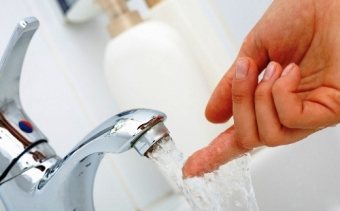
Probably everyone is familiar with this situation when you open a tap with hot water, and barely warm liquid runs out of it.
It’s not every time that you have the opportunity to wait for a lucky moment until water at the desired temperature comes out of the tap, and the presence of a meter that takes into account every resource consumed has developed a strong habit of saving.
So it turns out that most often in the morning we wash ourselves with cold or barely warm water, not to mention the fact that those who like to take a shower in the morning have a very difficult time. But what to do if cold water flows from a hot tap with enviable regularity, where to complain and how to solve the current problem?
What the law says
Before taking further steps, you should clearly understand what Russian legislation says about this in 2021. It clearly regulates the temperature of the water that should come from the hot water tap.
All requirements are outlined in two documents:
- “Rules for the provision of utility services to owners and users of premises in apartment buildings and residential buildings”, approved by Decree of the Government of the Russian Federation of May 6, 2011 N 354. The necessary information on water parameters is specified in Appendix No. 1.
- Sanitary and epidemiological rules and regulations SanPiN 2.1.4.2496-09 “Hygienic requirements for ensuring the safety of hot water supply systems.” This information is prescribed by the Decree of the Chief State Sanitary Doctor of the Russian Federation dated April 7, 2009 No. 20 “On approval of SanPiN 2.1.4.2496-09”.
Without going into details, the essence of these two official papers boils down to the following parameters that hot water must meet:
- The temperature in the water intake areas should not be lower than 60°C, but also not exceed 75°C. It does not matter what kind of water supply system is used in apartment buildings.
- Be prepared for the fact that before you can determine the temperature of the water flowing from the tap, you will still have to drain it. According to the regulations, it is necessary to drain for three minutes.
There are small deviations that are acceptable when supplying hot water:
The legislation specifies not only the requirements for the quality of water provided, but also the procedure for paying for water if it does not meet the requirements.
For water supplied below the required temperature, the supplier is obliged to recalculate. But you need to take note of some nuances:
The mechanism in this case is as follows: for every 3 degrees of deviation from the norm, the payment is reduced by 0.1% for each hour in which a decrease in water temperature was recorded.
Reasons for decreasing water temperature
Now that we’ve sorted out the legislative basis, it’s time to understand what caused such deviations, which lead to the owners of apartment buildings not receiving quality resources, and the resource supplying organization not receiving part of their income.
The reasons can be very different . Let's start with those hidden in the homes of consumers themselves. For example, it often happens that due to the design features of the water supply system, circulation is disrupted. As a result, the water stagnates in the risers, cooling down overnight.
This situation may arise due to the fact that the water supply does not regularly flush the system. If this is not done in a timely manner, the pipes become clogged with foreign debris, interfering with the quality water supply.
Incorrect installation of water heating devices, faucets, etc. can lead to a similar result . In all these situations, no matter how hard the resource supply organization tries, the problem of underheating in a given house will remain no matter what.
It is more serious when the water is below the required temperature due to external reasons. For example, the house is the end of a water supply branch. In this case, if the water supply line is not looped, then you are a “dead-end” recipient of water.
By the time the water reaches your address, it has lost its temperature and is no longer as hot, this problem is especially acute in the morning. The only way out in this situation is to change the water supply line, but this is too expensive a “pleasure”.
A decrease in the hot water outlet temperature can also occur because the resource supply organization does not carefully monitor the outlet water temperature . This is the most common option; as a rule, in this case, one call is enough to change the situation for the better.
What to do if cool water flows from a hot tap
What to do if cold water comes instead of hot water? Where to go in this case?
First of all, we call the management company and invite its representatives in order to record deviations from the norm. Remember, you can talk about recalculation only if there is an act in which this deviation is recorded.
In the event that specialists have recorded deviations from the norm, then starting from the day the report is drawn up, the legal requirement to reduce payment comes into force. This procedure for paying for hot water will continue until the commission draws up the next act, which will clearly indicate that the supplied water meets the required parameters.
This procedure corresponds to the ideal state of affairs . But what to do if the dispatcher at the management company does not want to respond to the request? Or was the act drawn up, but it never resulted in a positive reaction?
In this case, there is only one answer - we go to the GZHI - the state housing inspection. The latter has its own levers of influence on a negligent utility organization - a decision on a fine, revocation of a license, initiation of a lawsuit, etc.
You can, bypassing the State Property Committee, directly go to court on your own . In this case, the court will consider the claim for recovery of material damage in favor of the plaintiff. In this case, you can count on both material and moral damage. But get ready for the fact that there will be no quick decision from the court; the case will be considered for more than one week. As a rule, the court considers such cases in favor of the plaintiffs.
Another option to record violations of the temperature regime of the supplied water is to install meters with temperature sensors. This is expensive and not always justified, but temperature recording is carried out automatically around the clock. But keep in mind, this testimony will not be evidence of violations, it is just a reason to contact the management company.
If you do not have a meter with a temperature sensor, you can take measurements in another, cheaper way . Open the tap, run the water for 3-5 minutes, fill a small container with water and lower the thermometer into it, evaluate the result after a few minutes. If there are deviations from the norm, call the dispatcher. These measurements must be recorded. Please note that in accordance with Decree No. 354 of the Government of the Russian Federation, clause 108, measurements must be taken no later than two hours after receipt of the application.
The result of the commission's visit should be several copies of the act. One of which remains in the hands of the resource consumer. The commission may come after a longer period of time, but with mutual agreement.
In the event that specialists refuse to go to the address to take measurements, the owner of the apartment can independently draw up a report; this document must be signed by at least three witnesses. This act has exactly the same force as one drawn up by specialists and also serves as the basis for recalculation.
In this case, the period for ending the violation also ends with the corresponding fixation . Acts drawn up independently can be sent to the management company, Rospotrebnadzor, the prosecutor's office, or the magistrate's court.
There is only one conclusion - if you are regularly supplied with a low-quality resource, do not leave this situation without due attention and solve the current problem. In this case, the result will definitely be achieved.
How to solve the problem yourself?
The fight against public utilities may drag on for years, but it will never be resolved. But this problem can be solved independently.
We install a heat meter
You can install a thermometer. This device only records water that corresponds to the declared temperature. Anything below the norm is not taken into account. But be prepared for the fact that this device entails a number of difficulties.
The principle of operation of such a device is as follows: it distinguishes between the consumption of hot water and that which is below the required temperature. He transfers cool water into the cold water consumption column:
Installing a boiler
There is another, more radical way to solve the problem - install a boiler . With reasonable resource consumption, in a few years you will pay for the purchase of the boiler and at the same time receive stable hot water. But there are some nuances in this issue.
The water heater is installed on a cold water supply pipe, which according to regulations is much cheaper. To eliminate potential questions about why hot water consumption in your apartment has dropped sharply, it is better to seal it in advance and shut off the hot riser by the management company.
Be prepared for the fact that switching to autonomous hot water supply will lead to an increase in your hot water bill. Therefore, before purchasing a boiler, it is necessary to study this issue in detail and choose a device with optimal energy consumption.
It is best to choose a boiler with a capacity of up to 200 liters with heating element . Such a water heater provides heating of water inside the device and, thanks to the thermal insulation layer, retains heat well, preventing the water from cooling quickly.
With reasonable use of such a device, heating occurs gradually and the price is comparable to centralized water supply.
But you need to understand that in the case of a boiler, pouring water like from a hot tap will no longer work, since the capacity of the water heater is limited . Therefore, when the water is completely drained from the boiler, it takes time to heat up again to the desired temperature.
When installing a boiler, it is not necessary to shut off the hot water riser if the apartment has meters; this procedure is necessary only if there is no device and the calculation is carried out according to standards.
conclusions
If lukewarm water flows from a hot tap, this cannot be tolerated . It is necessary to take measures and eliminate your rights to receive quality services in all available ways.
This problem can be solved on your own by installing a boiler, or you can be patient and embark on a long process of sorting out relations with utility services and resource suppliers.
Reasons for non-compliance
There are several reasons why the hot water supply is not supplied properly . Reasons:
- The most common reason is the dishonest work of utility services, which do not heat the water to the required temperature.
- Defects in the water supply device. There is no necessary pressure, and after the night it is necessary to drain more cold water while warm water flows.
- Defects in the pipe through which water is supplied to the apartment.
- Unprofessionally installed pipeline elements.
- The apartment building is located at the end of the water supply path.
- Emergency situations.
Hot water is cool (low temperature), what to do and where to complain?
Author:
In apartment buildings, situations often arise when hot water from the tap runs barely warm for a significant period of time, we are not talking about 2 minutes, since some have encountered such a problem and they have been promised to correct the situation for several months, but nothing changes and in this article I will tell you if warm or cool water flows from a hot tap.
What to do if warm or cool water comes out of a hot tap?
The water temperature should be no lower than a certain minimum and no more than the maximum; the law has certain standards, which, unfortunately, a large number of residents who are somehow faced with a similar problem are not aware of.
There is an official document SanPiN 2.1.4.2496-09, approved by Decree of the Chief State Sanitary Doctor of the Russian Federation dated April 7, 2009 N 20. This document, or more precisely, paragraph 2.4 states that the temperature of hot water from a hot tap should not fall below 60 degrees and rise above 75 degrees. If the temperature goes beyond these limits, then this is considered a violation and residents are entitled to a recalculation.
But there are so-called permissible deviations up or down, which are also enshrined in law. In paragraph 5 of Appendix No. 1 to the Decree of the Government of the Russian Federation dated 06.05.2011 N 354, it is stated that at the point of water intake, a temperature deviation at night from 0:00 to 5:00 is possible, the deviation cannot be more than 5 degrees, and at daytime from 5:00 to 0:00 the temperature deviation cannot be more than 3 degrees.
The following picture emerges: the legislator, as it were, allowed the temperature to be lowered at night by 5 degrees, and during the day by 3 degrees, and nothing can be done, which Management Companies (hereinafter referred to as Management Companies) successfully use. The deviation is considered as follows: if during the day the permissible temperature with the deviation is 57 degrees, then at night it can be 55 degrees. Recalculation can be carried out only if the water temperature becomes lower by 3 degrees, taking into account the deviation, then if during the day the temperature of the water from the hot tap is 54 degrees, then by law you can demand a recalculation and a reduction in the payment for hot water for each hour billing period when the temperature dropped to 54 degrees by 0.1%, for every 3 degrees of deviation, and it turns out that if the temperature has already deviated by 6 degrees and is 51 degrees, then the reduction in fees for each hour of the billing period will be 0.2%.
Let me give you an example of recalculation:
Let's say 20 days out of the billing period, hot water was supplied with deviations from the norm by 6 degrees. 20 days is 480 hours. Consumption for the billing period according to the meter was 1 m3, the cost of one cubic meter was 310 rubles.
- For every 3 degrees of deviation, the decrease occurs by 0.1%, we have a deviation of 6 degrees, so the decrease in our case will be 0.2%;
- The cost of 1 m3, which in our case was consumed, is 310 rubles;
- Let's calculate the payment for 1 day and divide 310 by 30 days (billing period) and get 10.33 rubles. spent on water per day;
- 10.33 rub. * 0.2% * 480 hours = 102.44 rubles;
- The total amount to be paid in a particular case will be 310 – 102.44 = 207.56 rubles. will need to be paid taking into account recalculation.
Therefore, it is always necessary to request a recalculation from the management company. But in order to demand it, you need to notify your management company that you have serious deviations from the water temperature standards.
Notify your management company that the hot water temperature is below the standard, but first of all, notify the emergency dispatch service:
- Call emergency dispatch and tell them about your problem. Ask the operator to give his full name, and also ask him to name the number of your request; usually the operator records all requests in a special journal. Write down the request number and the operator’s full name, as well as the date of the request. If the emergency service knows the reasons for the low water temperature, then they will be announced to you, and if not, then the emergency service will have to conduct an inspection;
- Next, you need to contact your management company and demand that they assemble a commission, come to your home and draw up a report on the presence or absence of a deviation in the temperature of the hot water. You can call your management company and also write down the number of your request and the name of the operator, I would recommend doing so. Discuss with the operator when representatives of the management company will come to you (agree on a time), take measurements and draw up a report;
- At the appointed time, a commission from the management company will arrive, take measurements and draw up a report, which will reflect the presence or absence of deviations, how many degrees the deviation is present. If the measurements of the management company do not suit you, then you can invite an independent expert, his services are paid, and if it turns out that the management company carried out correct measurements, then the owner of the apartment pays for the expert’s services, and if the expert reveals deviations, then the management company will pay for his services;
- Read the act carefully, the number of its copies must be equal to the number of interested parties present at the inspection, each party signs the act and each party is given a copy of the act, pay attention to the date the act was drawn up, it must be written.
If representatives of the management company do not come and do not respond to your appeal, then you have the right to draw up an act yourself, inviting at least two more consumers (neighbors) and the chairman of the council of an apartment building or the chairman of the HOA, each of those present when drawing up the act signs all copies of the act and takes his copy for himself.
It is better to contact the Criminal Code in writing, write your application in 2 copies and submit it to the Criminal Code, your copy should be marked with acceptance, the date of acceptance and keep the copy for yourself, in case representatives of the Criminal Code do not come and you decide to draw up an act without them , your copy will be proof that you invited the management company to conduct an assessment of the quality of services, but they did not come.
When you have in your hands a report on services of inadequate quality, you can demand from the management company not only a recalculation of fees for services, but also a complete correction of the deficiencies.
It is also necessary to demand only in writing, write a statement with your requirements for recalculation, attaching a copy of the report on the inadequate quality of services, and also demand that the deficiencies be corrected and the temperature of the hot water returned to normal. Write such an application in 2 copies and submit it to your management company; your copy must be marked with acceptance and date.
You can send an application by mail to the management company, always with a list of the contents and a notification of delivery.
If there is no response to your application, then you can complain to the Housing Inspectorate; this can be done either in writing or through the website. You can write a complaint to the prosecutor's office. You can achieve justice through the court.
To contact any of the above authorities, you will definitely need an act, all the statements that you sent to the Criminal Code and other documents that are relevant to the case.
Seek justice and do not give up, as there are many difficulties in the fight against the Criminal Code.
I hope the article was useful to you and clarified the situation for you. If you have any questions, please ask them on the website.





